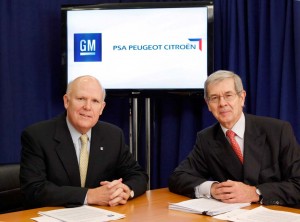General Motors now holds a 7% stake of French automaker PSA Peugeot Citroen, the first critical step in an alliance announced a month ago – and one that the French automaker is already signaling it would like to expand.
GM’s acquisition was linked to a new Peugeot stock offering that the Paris-based maker intended to raise 1 billion Euros ($1.32 billion) in much-needed capital. In fact, demand for the share issue by Europe’s second-largest automaker ran about 78% above the original target, at 1.78 billion Euros.
GM now becomes the second-largest shareholder in PSA Peugeot Citroen after the founding Peugeot family. Represented by several key executives, including chairman Phillippe Varin, the family itself holds a 25% stake – but has 38% of the corporate voting rights.
The alliance, announced on February 29th, is intended to save the two makers at least $2 billion over the next five years. Both companies can use the help, especially in Europe. GM’s German-based Opel subsidiary has been struggling for a turnaround and last year lost over $700 million.
The two partners plan to work together on a variety of projects that could include the joint development and production of product platforms and powertrains. Initially, that is expected to include family vans, crossover vehicles and smaller passenger cars. GM and Peugeot also will team up on purchasing efforts that could leverage greater economies of scale. Together, they buy about $125 million in basic commodities, parts and components annually.
But they stressed, at the outset, that each company would continue to “market and sell its vehicles independently and on a competitive basis.”
The GM-Peugeot partnership is the latest in a series of tie-ups between global automotive giants. PSA’s French rival, Renault, has a well-entrenched partnership with Japan’s Nissan, and together, the Renault-Nissan Alliance has been rapidly expanding its ties with Germany’s Daimler AG.
Significantly, those three partners recently announced plans to jointly produce engines at a Nissan plant in Tennessee that will go into the next-generation Mercedes-Benz C-Class when it begins production on a U.S. assembly line. And, as TheDetroitBureau.com reported, Mercedes is strongly considering a plan to erect a new assembly plant adjacent to the factory Nissan is building in Aguas Calientes, Mexico.
As with Renault, Nissan and Daimler, the GM-Peugeot partnership may quickly expand well beyond its original goals.
The French maker last week revealed the partners are discussing ways to cooperate on more vehicle segments and additional technologies. Among other joint ventures Peugeot said it is discussing with GM are:
- Larger vehicles;
- A small car that could be shared in Latin America and other emerging markets; and
- Double-clutch automatic transmissions.
The new alliance has generated a fair degree of controversy, especially in light of the many failed alliances GM has walked away from in recent years. That includes one with Fiat that the American maker had to pay $2 billion to exit. But GM officials insist they have learned their lessons and will now take steps to ensure the new PSA partnership remains focused, with executives clearly held accountable for its results.


Drove a Peugeot 508 diesel last year in Norway. I was very impressed with the clean diesel technology, the fit and finish was excellent,and it was a fun rig to drive. This could be a good collaboration if egos don’t get in the way. Maybe we can get more diesel vehicles on our roads and get diesel fuel prices down below unleaded where it should be.
Many of us – myself included – would be very happy to see this deal increase the use of diesels in the U.S. market.
Paul A. Eisenstein
Publisher, TheDetroitBureau.com